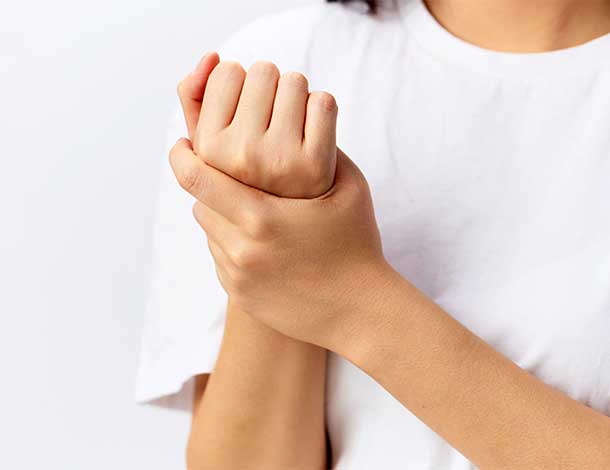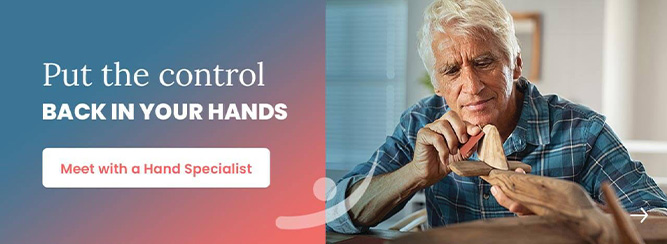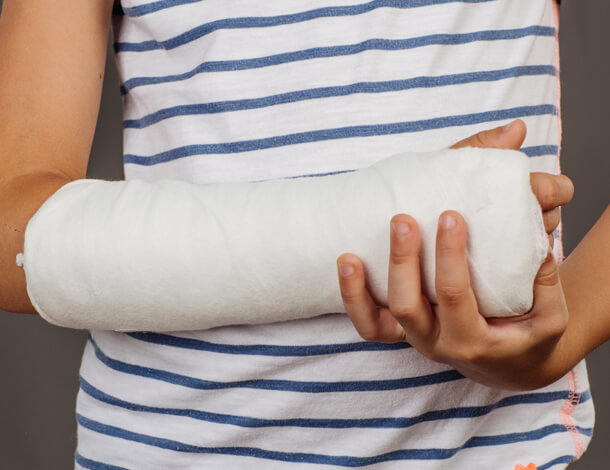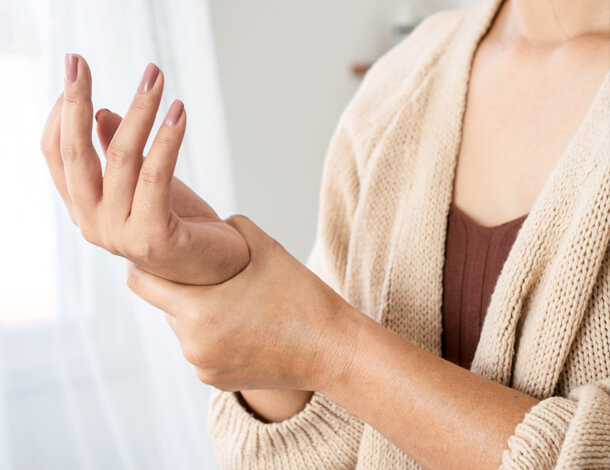Do You Have a Broken Side of Hand? Signs You Should Seek Medical Care

Can your hand be broken without bruising? Is it even possible to fracture the bone on the side of your hand? How can you tell if you have a broken fifth metacarpal bone? After getting injured, patients who suspect they might have a broken side of hand come to us with a lot of questions.
A fracture may be just one reason you may be experiencing hand pain below your pinky finger, so it’s critical to get checked by an experienced hand specialist to determine the reason for your discomfort.
Keep reading to learn the signs you might have broken the side of your hand. Plus, find out who is most at risk for this type of hand injury and how the condition is treated.
What Causes a Fracture in the Side of Your Hand?
One of the most common sites for breaks and fractures is the side of your hand. This injury typically results from direct damage to a clenched fist, which is why it’s also called a boxer’s fracture.
Breaking the side of your hand can happen after punching a hard, solid object like a wall. The neck of the fifth metacarpal bone (and all others) is one of the weakest spots in your hand, so fractures in this location are typical.
How to Tell If You Might Have Broken the Side of Your Hand
Symptoms of a boxer’s fracture can vary from one person to another. Signs that the side of your hand is broken may include:
- Snapping or popping sensations
- Numbness
- Swelling, bruising, or discoloration around the pinky
- Knuckle deformity
- Pain or tenderness to the touch, especially when pushing your pinky inward
- Movement of the broken bone fragments
- Limited range of motion of the hand or ring and pinky fingers
- Inconsistent temperatures between the injured and uninjured hands
If your injured pinky finger appears misaligned when making a fist or you notice a cut at the injury site, it’s possible you’ve suffered a more serious type of fracture.
Complications from a boxer’s fracture may occur if not treated immediately, which could lead to a decreased ability to grip using your injured hand, limited range of motion of the pinky, and a crooked finger.
Who Is Most at Risk for Having a Broken Side of Hand?
Boxers aren’t the only people to suffer from a fractured side of the hand. Anyone who is in a situation where they punch a hard surface could be at risk for developing this injury.
Some scenarios may include:
- Punching an object or person
- Suffering a cut from a sharp object
- Getting in an accident where an object goes through your hand
Treatment for a Broken Fifth Metacarpal
To avoid complications, seek medical attention promptly if you suspect you may have a fracture from injuring the side of your hand.
After proper treatment from a hand specialist, a broken side of hand shouldn’t continue to hurt. If it does, or if your hand motion becomes more limited, these could be signs you’ve experienced a more severe side hand fracture or have an infection.
Non-Surgical Treatments for Hand Fractures
Some immediate ways you can treat symptoms of a broken side of your hand include:
- Icing and elevating your injured hand to reduce pain and swelling
- Cleaning and bandaging your hand to promote healing and prevent infection if you notice a cut on the injured area
- Resting your hand for a few days
- Taking over-the-counter or prescription medication as directed by your doctor
- Wearing a splint or cast for several weeks, keeping it dry, and paying attention to any numbness, tingling, or swelling that may occur
When Is Surgery Needed for a Broken Side of Hand?
Depending on the severity of the fracture, you may need hand surgery. This is determined by a doctor’s assessment and x-rays.
You may need surgery for a fractured side of your hand if there is:
- Damaged tissue on the injury site that needs to be removed
- A serious open wound caused by your injury
- Ligament, tendon, blood vessel, or nerve damage
- Significant joint displacement
Following surgery for a fracture on the side of your hand, your care team will give you advice about the healing process, including details about wearing a splint, medications, and starting occupational therapy (as needed).
Get Relief at Indiana Hand to Shoulder Center
If you suspect you’ve broken the side of your hand, see a hand specialist to get a definitive diagnosis and start treatment.
Indiana Hand to Shoulder Center helps patients with a variety of upper extremity injuries and conditions. Get hand pain relief after an injury to the side of your hand from our world-renowned upper extremity surgeons and prominent hand therapists.
Call us at (317) 875-9105 or schedule an appointment online.

You Might Also Like:
- Feeling Hand Stiffness? One of These Conditions Could Be to Blame
- William B. Kleinman MD Recognized as an International Pioneer in Hand Surgery by the International Federation of Societies for Surgery of the Hand (IFSSH)
- Carpal Tunnel Relief: How to Stop Hurting From Hand and Wrist Pain
Custom Orthoses in Hand Therapy: Types, Benefits, and Uses
Disclaimer: The materials on this website have been prepared for informational purposes only and do not constitute advice. You should not act or rely upon any medical information on this website without a physician’s advice. The information contained within this website is not intended to serve as a substitution for a thorough examination from a qualified healthcare provider. The display of this information is not intended to create a health care provider-patient relationship between the Indiana Hand to Shoulder Center and you.



